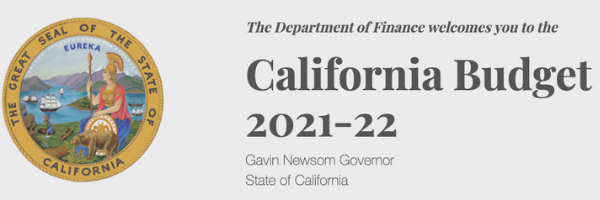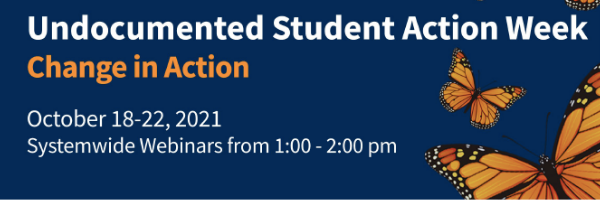In this Issue:
- Thank California Legislators for Their Support in the 2021-22 Enacted Budget
- An Update on Priority Legislation
- Recall Election: California at a Crossroads
- Undocumented Student Action Week is October 18-22, 2021
- Bi-Monthly CEO and Trustee Webinars Return in September
- Join Us for our Next GR Webinar: Tuesday, September 21 at 11:00 a.m.
- Federal Grant Opportunities
- Upcoming Events
Thank California Legislators for Their Support in the 2021-22 Enacted Budget
Throughout the legislative year, the League consistently focused on equity, advocating for an E-shaped economy, where everyone can participate and prosper, instead of the current K-shape, where only a few benefits and the rest are left behind. We are grateful to Governor Newsom for emphasizing equity in his budget and to the legislators who supported this goal. Central to our message was the role of the California Community Colleges in fostering such equity and the need for historic levels of investment in our institutions.
We now need your help in thanking our legislators, who were most influential in turning the League’s vision for the 2021-22 budget into reality. Below are the Twitter handles for some of our top legislative allies, along with sample tweets.
Click here to download our graphic.
Legislative Targets
Be sure to include these legislators in your tweets.
@CAgovernor @GavinNewsom
@Rendon63rd
@SenToniAtkins
@AsmJoseMedina
@AsmKevinMcCarty
@NancySkinnerCA
@PhilTing
@SenJohnLaird
@SenatorLeyva
@CALtGovernor @EleniForCA
@ScottWilkCA
@J_GallagherAD3
@rosilicie
@AsmPatODonnell
Sample Tweets
@CAgovernor @GavinNewsom We appreciate your support of @CalCommColleges. The enacted 2021-22 #CAbudget makes critical investments at our institutions and will allow us to move towards an E-shaped or equity-based recovery economy. @ccleague #EquityinEducation #CaComeback
Thank you @SenToniAtkins @Rendon63rd @SenJohnLaird @AsmKevinMcCarty and the entire #CAleg for investing in @CalCommColleges as we strive to build a better, stronger, and more equitable #California. #CAbudget @ccleague #CCalwaysessential #CaComeback
We are appreciative the #CAbudget gives maximum flexibility to our local districts and reinforces local decision-making. This is necessary to achieve student success at @CalCommColleges and create a more equitable E-shaped economy. @ccleague #EquityinEducation #CaComeback
Thank you @AsmKevinMcCarty @AsmJoseMedina @NancySkinnerCA @PhilTing @SenJohnLaird @SenatorLeyva for supporting our college. @CalCommColleges are always essential. @ccleague #CCalwaysessential #CaComeback
When we invest in @CalCommColleges we all advance. The 2021-22 #CAbudget moves us toward an E-shape or equity-based economy and our colleges can help the state to recover from the pandemic. Thank you @NancySkinnerCA @PhilTing @SenJohnLaird @SenatorLeyva #EquityinEducation
An Update on Priority Legislation
A critical legislative milestone was reached last week: the fiscal committee deadline. To remain available for consideration, all legislation with a fiscal cost must be passed out of either the Assembly or Senate Appropriations Committee.
In theory, these committees offer a chance for the legislature to consider the cost of implementing legislation in the context of their overall spending proposals. It is also a way for legislative leadership to either hold bills or insert amendments that would be difficult to do in other committees on the legislative floor. Below is an update on the League’s priority legislation. For a full list of League-tracked legislation, please click here.
League Priority Bills
AB 927 (Medina) BA Degrees
Would permit community colleges to offer baccalaureate degrees that are not offered by the UC and CSU and remove the sunset date of the current 15 college program.
Amendments Taken in Committee: Requires the UC and CSU to file a formal objection to address specified issues to address the consultative process.
Action: Passed out of the Senate Appropriations Committee.
AB 1456 (Medina) Financial Aid Reform
Would reform the state’s system of financial aid by:
- Creating two new Cal Grant Awards focused on either four-or two-year students.
- Significantly expanding the number of students eligible for awards.
- Two-year award focused on access costs.
Notes: It is critical to understand that while the Governor and state legislators reached a deal to increase access to Cal Grants in the 2021-22 budget, they did not fund the items in AB 1456 (Medina). Thus, it faces a challenge getting signed into law, but League staff are hopeful that the legislation can be used as a vehicle to continue to advocate for Cal Grant reform.
Amendments Taken in Committee: Program will only become operative if an appropriation is made to fund it.
Action: PASSED out of the Senate Appropriations Committee.
Academic Affairs
AB 928 (Berman) Transfer
Introduced to smooth out the ADT approval, adoption, and utilization process, this bill would:
- Create a committee charged to make recommendations to the legislature on ways to improve the transfer process.
- The proposed committee would be made up of the following:
-
- Three representatives from each of the system offices of the UC/CSU/CCC.
- Three representatives from each of the Academic Senates of the UC/CSU/CCC.
- Three representatives from each of the student body organizations of the UC/CSU/CCC.
- One member from the California Intersegmental Articulation Council.
- Three members of the public, one each appointed by the Governor and state legislature.
- Require the UC and CSU to adopt one unified transfer pathway.
- Require community college students to be automatically enrolled in an ADT program. Those who intend to transfer to the UC or prefer a traditional AA would need to opt-out.
Amendments Taken in Committee: Provides that the singular GE pathway would not include more units that are required under the IGETC transfer pathway, allows community colleges to utilize Guided Pathways Program funds to implement the bill, and adds an additional community college student on the proposed committee.
Notes: The League and our coalition partners within the Academic Senate and the Faculty Association for California’s Community Colleges are strongly supportive of a committee empowered to take a hard look at how our higher education systems are doing on transfer. However, we have significant concerns about the unintended consequences of the mandates within the bill and have thus asked that they be amended out and the committee asked to consider them.
Action: PASSED out of the Senate Appropriations Committee.
AB 1111 (Berman) Common Course Numbers
Would require California community colleges to establish a common course numbering system.
Amendments Taken in Committee: Extends the implementation deadline to July 1, 2024.
Notes: The 2021-2022 budget appropriates $10 million in one-time Proposition 98 dollars to fund a common course number system.
Action: PASSED out of the Senate Appropriations Committee.
Collective Bargaining
AB 438 (Reyes) Classified Employees: Layoff Notices and Hearings
Would provide classified school employees with the same rights to a notice and hearing with respect to layoffs as is provided to certificated employees of school districts or academic employees at community colleges.
Amendments Taken in Committee: If classified positions must be eliminated because of the expiration of funds for a program, the bill requires written notice of the layoff date and certain rights to be given to those employees at least 60 days before the layoff date.
Notes: This bill is opposed by a range of K-12 and community college district management groups.
Action: PASSED out of the Senate Appropriations Committee.

Recall Election: California at a Crossroads
Over the last month, pollsters have indicated the consensus is no consensus. In the state that just two years ago chose Biden by 63% over 34% for Trump and two years before that preferred Newsom over Cox by a margin of 62% to 38%, Californians are split on whether Governor Newsom should complete the last year of his four-year term or change leaders. While some are energized by the possibilities, others are disgusted by the $276 million public price tag, particularly when the next scheduled gubernatorial election is one year later. If there’s any agreement, it’s that apathy could win if it somehow appeared on the ballot. Although the Public Policy Institute of California has recently released polling data that indicates voters may now be leaning towards voting against the recall.
National observers have recently awoken to the story as the implications are huge. In a liberal state that has miraculously reversed its decades-long budget woes and avoided the paralyzing political scandals that have plagued other states like New York most recently, there’s an interest to know what’s going on and what it means for the country.
Part of this is uniquely Californian as the system is set up with two questions: the recall determined by a majority and the succession determined by a plurality. As such, an extreme conservative with a small but active base could become Governor if the voters approve the recall. Strategically, the California Democrats made two decisions that could either help or harm them: first, to advance the date of the recall—now set at September 14—second, to not officially field a candidate in the succession election, making the entirety of their campaign about the recall. This is a significant departure from the 2003 experience when Democratic voters were encouraged to vote No on the recall and support the then Lt. Governor Cruz Bustamante in the succession. For their part, Republicans have eschewed endorsing a single candidate, making their unified message on the recall.
What is more relevant to the rest of the country is the prospect of voter disaffection with whatever party is in power. Frustrations with the economy, COVID, and housing prices are not limited to California and may easily spill onto the congressional midterms next year. There is also interest in Gavin Newsom’s future and whether the recall will bolster or hamper his prospects for an eventual run at the White House.
Without partisan editorializing, California Community Colleges must recognize the stakes. Although our institutions are locally governed, the Governor has the most significant voice in the development of the state budget as well as the authority to sign or veto legislation. Moreover, the Governor has the power of appointment, including most of the California Community Colleges Board of Governors, which determines the selection of the Chancellor. All strata of our system should engage in this election as the state is once again at a crossroads, and the competing visions are dramatic.
We encourage you to review the FAQ on the recall and succession election prepared by the Secretary of State. Although the last day to register to vote in this election is August 30th, the FAQ contains information on casting a provisional ballot for those who missed that deadline. The last day to vote is September 14th.
Undocumented Student Action Week is October 18-22, 2021
In the last five years, our collective budget and legislative advocacy during Undocumented Student Action Week have led to funding for Dream Resource Centers and Liaisons, the establishment of an Immigration Legal Services Project, the expansion of AB 540 eligibility, and the protection of DACA. We know all too well that change is important every day of the year, not just during action week. This year’s theme, “Change in Action,” empowers us to engage in state, federal, and local action to support undocumented students in their goal of earning a college education. We must think about the ways we can cultivate and empower change that is long lasting.
During 2021 Undocumented Student Action Week, the California Community Colleges will be hosting a system webinar Monday-Friday from 1:00 – 2:00 p.m. More information will be shared on the Chancellor’s Office website. If you have any USAW questions, email undocuinfo@foundationccc.org.
Bi-Monthly CEO and Trustee Webinars Return in September
The League hosts webinars for both Trustees and CEOs to assist them in their roles. Our webinars will continue to feature campus leaders, best practices from across the system, and a space for open and continued dialogue regarding these uncertain times. The League hosts a webinar for CEOs on the 2nd and 4th Tuesday of the month from 12:00 p.m. – 1:00 p.m. and a webinar for Trustees on the 2nd and 4th Thursday of the month from 12:00 p.m. – 1:30 p.m. CEOs and Trustees are also invited to the DEI Town Hall Series focused on diversity, equity, and inclusion practices at California Community Colleges.
These webinars and town halls will be guided discussions, planned as needed, and facilitated by League staff, CEOCCC, and CCCT Board leadership.
Click Here to Learn More
Join Us for our Next Webinar: Tuesday, September 21 at 11:00 a.m.
Join the League's Monthly Government Relations Webinar on Tuesday, September 21 at 11:00 a.m. for legislative and policy updates.
2021 Webinar Schedule
Every third Tuesday of the month, 11:00 a.m. - 12:00 p.m.
Tuesday, September 21
Tuesday, October 19
Webinar Details
Telephone Number: (646) 876-9923 or (669) 900-6833
Zoom Meeting ID: 623 780 059
Passcode: 550660
Registration
Be sure to register in advance for this meeting. After registering, you will receive a confirmation email with information about joining the webinar.

Federal Grant Opportunities
Presented by Downs Government Affairs
The League, in partnership with Downs Government Affairs, provides a list of federal grants to assist your community college in improving its programs and services. If you have any questions about the following grants, please feel free to reach out to Thomas Downs at TCDowns@downsgovaffairs.com.
For a full list of federal grants available to community colleges, visit our Federal Grants page at www.ccleague.org/federal-grant-opportunites
Upcoming Events
Consultation Council
September 16
Board of Governors Meeting
September 20-21
ACCT Leadership Congress
October 13-16 | San Diego
Undocumented Student Action Week
October 18-22, 1:00-2:00 p.m.
Systemwide Webinars
ACHRO Fall Training Institute
October 20-21 | Virtual Event
ACBO Fall Conference
October 25-27 | San Diego
Academic Senate Plenary
November 4-6 | Hybrid Event: Long Beach and Virtual
League Annual Convention
November 16-19 | Virtual Event
For more information, contact the League's Government Relations and Communications staff: advocacy@ccleague.org
Follow League Tracked Bills at www.ccleague.org/advocacy/bill-tracking
For news related to the State Budget and Policy visit www.ccleague.org/advocacy












